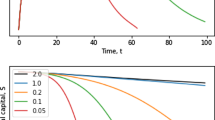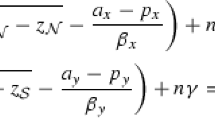Abstract
In the macro context of production decentralization and trade liberalization, biodiversity conservation and academic research have focused on clarifying the factors of biodiversity loss driven by international trade. Based on the MRIO model framework, this study measures and comparatively analyzes global biodiversity loss from 2006 to 2015. This is based on the Red List of Threatened Species database. It provides a normative interpretation of the mechanisms of economic growth and government efficiency in biodiversity loss with the help of spatial econometric methods. Economic growth and regional biodiversity loss showed an “inverted U” type relationship. When the economic growth level reaches a certain threshold, increasing it reduces the intensity of the biodiversity loss. Government efficiency has a significant spatial spillover effect and can significantly reduce biodiversity loss in the surrounding areas. Accordingly, this study suggests that in the process of biodiversity conservation, countries/regions need to effectively play a positive role in reducing the risk of biodiversity loss through economic growth, promoting the coordination between economic growth and biodiversity conservation, and promoting the formation of a synergistic mechanism. This study has important policy implications for developing a practical and feasible “post-2020 global biodiversity framework” and effective biodiversity conservation program.



Similar content being viewed by others
Data availability
The data used during the current study are available from the corresponding author on reasonable request.
Notes
In conducting the regression analysis, this study first introduced the primary, secondary, and tertiary terms of economic growth into the equation but found that the coefficient of the tertiary term was insignificant and excluded, so the final choice was to report the estimation results that included its primary and secondary terms.
References
Barlow, J., Parry, L., Gardner, T. A., et al. (2012). The critical importance of considering fire in REDD+ programs. Biological Conservation, 154, 1–8. https://doi.org/10.1016/j.biocon.2012.03.034
Bastian, O., Syrbe, R., Rosenberg, M., Rahe, D., & Grunewald, K. (2013). The five pillar EPPS framework for quantifying, mapping and managing ecosystem services. Ecosystem Services, 4, 15–24. https://doi.org/10.1016/j.ecoser.2013.04.003
Bennett, J. R., Maloney, R. F., Steeves, T. E., et al. (2017). Spending limited resources on de-extinction could lead to net biodiversity loss. Nature Ecology and Evolution, 1(4), 53. https://doi.org/10.1038/s41559-016-0053
Betts, M. G., Wolf, C., Ripple, W. J., et al. (2017). Global forest loss disproportionately erodes biodiversity in intact landscapes. Nature, 547(7664), 441–444. https://doi.org/10.1038/nature23285
Blicharska, M., Smithers, R. J., Mikusiński, G., et al. (2019). Biodiversity’s contributions to sustainable development. Nat Sustain, 2(12), 1083–1093. https://doi.org/10.1038/s41893-019-0417-9
Cardinale, B. J., Duffy, J. E., Gonzalez, A., et al. (2012). Biodiversity loss and its impact on humanity. Nature, 486(7401), 59–67. https://doi.org/10.1038/nature11148
Chaudhary, A., Pfister, S., & Hellweg, S. (2016). Spatially explicit analysis of biodiversity loss due to global agriculture, pasture and forest land use from a producer and consumer perspective. Environmental Science and Technology, 50(7), 3928–3936. https://doi.org/10.1021/acs.est.5b06153
Chaves, L. S. M., Fry, J., Malik, A., et al. (2020). Global consumption and international trade in deforestation-associated commodities could influence malaria risk. Nature Communications, 11(1), 1258. https://doi.org/10.1038/s41467-020-14954-1
Chen, S., Zhang, H., & Wang, S. (2022). Trade openness, economic growth, and energy intensity in China. Technological Forecasting and Social Change, 179, 121608. https://doi.org/10.1016/j.techfore.2022.121608
Danish, R. U., & Khan, S. (2020). Relationship between energy intensity and CO2 emissions: Does economic policy matter? Sustainable Development, 28(5), 1457–1464. https://doi.org/10.1002/sd.2098
Di Vaio, A., Hasan, S., Palladino, R., & Hassan, R. (2023a). The transition towards circular economy and waste within accounting and accountability models: A systematic literature review and conceptual framework. Environment, Development and Sustainability, 25, 734–810. https://doi.org/10.1007/s10668-021-02078-5
Di Vaio, A., Palladino, R., Pezzi, A., & Kalisz, D. E. (2021). The role of digital innovation in knowledge management systems: A systematic literature review. Journal of Business Research, 123, 220–231. https://doi.org/10.1016/j.jbusres.2020.09.042
Di Vaio, A., Zaffar, A., Balsalobre-Lorente, D. (2023a). Carbon and Decarbonization Disclosure: Role of Responsible Innovation in Adoption of Artificial Intelligence of Things towards SDGs. In book: Artificial Intelligence of Things for Achieving Sustainable Development Goals (Misra, S.; Siakas, K.; Lampropoulos, G. Eds.) (pp.18).
Di Vaio, A., Latif, B., Gunarathne, N., Gupta, M., & D’Adamo, I. (2023b). Digitalization and artificial knowledge for accountability in SCM: A systematic literature review. Journal of Enterprise Information Management. https://doi.org/10.1108/JEIM-08-2022-0275
Fearnside, P. M. (2001). Soybean cultivation as a threat to the environment in Brazil. Environmental Conservation, 28(1), 23–38. https://doi.org/10.1017/S0376892901000030
Feng, X., Merow, C., Liu, Z., et al. (2021). How deregulation, drought and increasing fire impact Amazonian biodiversity. Nature, 597(7877), 516–521. https://doi.org/10.1038/s41586-021-03876-7
Grossman, G. M., & Krueger, A. B. (1995). Economic growth and the environment. Nber Working Papers 110. Quarterly Journal of Economics, 110(2), 353–377. https://doi.org/10.2307/2118443
IUCN (2016). The IUCN red list of threatened species. Version 2016–2, Retrieved from http://www.iucnredlist.org
Jetz, W., McGowan, J., Rinnan, D. S., et al. (2022). Include biodiversity representation indicators in area-based conservation targets. Nature Ecology and Evolution, 6(2), 123–126. https://doi.org/10.1038/s41559-021-01620-y
Joppa, L. N., O’Connor, B., Visconti, P., et al. (2016). Big data and biodiversity. Filling in biodiversity threat gaps. Science, 352(6284), 416–418. https://doi.org/10.1126/science.aaf3565
Kok, A., Oostvogels, V. J., de Olde, E. M., & Ripoll-Bosch, R. (2020). Balancing biodiversity and agriculture: Conservation scenarios for the Dutch dairy sector. Agriculture, Ecosystems and Environment, 302. https://doi.org/10.1016/j.agee.2020.107103
Lenzen, M., Moran, D., Kanemoto, K., et al. (2012). International trade drives biodiversity threats in developing nations. Nature, 486(7401), 109–112. https://doi.org/10.1038/nature11145
Liu, D., Semenchuk, P., Essl, F. et al. (2023). The impact of land use on non-native species incidence and number in local assemblages worldwide. Nature Communications, 14(1). https://doi.org/10.1038/s41467-023-37571-0
Marques, A., Martins, I. S., Kastner, T., et al. (2019). Increasing impacts of land use on biodiversity and carbon sequestration driven by population and economic growth. Nature Ecology and Evolution, 3(4), 628–637. https://doi.org/10.1038/s41559-019-0824-3
Meijaard, E., Azhar, B., et al. (2021). Oil palm plantations in the context of biodiversity conservation. Reference Module in Life Sciences. https://doi.org/10.1016/B978-0-12-822562-2.00017-7
Millard, J., Outhwaite, C. L., Kinnersley, R., et al. (2021). Global effects of land-use intensity on local pollinator biodiversity. Nature Communications, 12(1), 2902. https://doi.org/10.1038/s41467-021-23228-3
Millennium Ecosystem Assessment. (2005). Ecosystems and human well-being. Synthesis. Washington, DC: Island Press
Moran, D., & Kanemoto, K. (2017). Identifying species threat hotspots from global supply chains. Nature Ecology and Evolution, 1(1), 23. https://doi.org/10.1038/s41559-016-0023
Mori, A. S., Dee, L. E., Gonzalez, A., et al. (2021). Biodiversity–productivity relationships are key to nature-based climate solutions. Nature Climate Change, 11(6), 543–550. https://doi.org/10.1038/s41558-021-01062-1
Morton, O., Scheffers, B. R., Haugaasen, T., & Edwards, D. P. (2021). Impacts of wildlife trade on terrestrial biodiversity. Nature Ecology and Evolution, 5(4), 540–548. https://doi.org/10.1038/s41559-021-01399-y
Newbold, T., Hudson, L. N., Hill, S. L., et al. (2015). Global effects of land use on local terrestrial biodiversity. Nature, 520(7545), 45–50. https://doi.org/10.1038/nature14324
Nicol, S., Brazill-Boast, J., Gorrod, E., et al. (2019). Quantifying the impact of uncertainty on threat management for biodiversity. Nature Communications, 10(1), 3570. https://doi.org/10.1038/s41467-019-11404-5
Nwani, C., & Adams, S. (2021). Environmental cost of natural resource rents based on production and consumption inventories of carbon emissions: Assessing the role of institutional quality. Resources Policy, 74, 102282. https://doi.org/10.1016/j.resourpol.2021.102282
Pereira, H. M., Ferrier, S., Walters, M., et al. (2013). Ecology. Essential biodiversity variables. Science, 339(6117), 277–278. https://doi.org/10.1126/science.1229931
Philpott, S. M., Arendt, W. J., Armbrecht, I., et al. (2008). Biodiversity loss in Latin American coffee landscapes: Review of the evidence on ants, birds, and trees. Conservation Biology: The Journal of the Society for Conservation Biology, 22(5), 1093–1105. https://doi.org/10.1111/j.1523-1739.2008.01029.x
Scheffers, B. R., De Meester, L., Bridge, T. C., et al. (2016). The broad footprint of climate change from genes to biomes to people. Science, 354(6313), 11. https://doi.org/10.1126/science.aaf7671
Scheffers, B. R., Oliveira, B. F., Lamb, I., & Edwards, D. P. (2019). Global wildlife trade across the tree of life. Science, 366(6461), 71–76. https://doi.org/10.1126/science.aav5327
Seidl, A., Mulungu, K., Arlaud, M., van den Heuvel, O., & Riva, M. (2021). The effectiveness of national biodiversity investments to protect the wealth of nature. Nature Ecology and Evolution, 5(4), 530–539. https://doi.org/10.1038/s41559-020-01372-1
Seto, K. C., Golden, J. S., Alberti, M., & Turner, B. L. (2017). Sustainability in an urbanizing planet. Proceedings of the National Academy of Sciences of the United States of America, 114(34), 8935–8938. https://doi.org/10.1073/pnas.1606037114
Smith, R. J., Muir, R. D., Walpole, M. J., Balmford, A., & Leader-Williams, N. (2003). Governance and the loss of biodiversity. Nature, 426(6962), 67–70. https://doi.org/10.1038/nature02025
Steffen, W., Broadgate, W., Deutsch, L., Gaffney, O., & Ludwig, C. (2015). The trajectory of the Anthropocene: The great acceleration. Anthropocene Review, 2(1), 81–98. https://doi.org/10.1177/2053019614564785
Tilman, D., Clark, M., Williams, D. R., et al. (2017). Future threats to biodiversity and pathways to their prevention. Nature, 546(7656), 73–81. https://doi.org/10.1038/nature22900
Tittensor, D. P., Walpole, M., Hill, S. L., et al. (2014). A mid-term analysis of progress toward international biodiversity targets. Science, 346(6206), 241–244. https://doi.org/10.1126/science.1257484
Tollefson, J. (2019). Humans are driving one million species to extinction. Nature, 569(7755), 171. https://doi.org/10.1038/d41586-019-01448-4
Ulloa, A. M., Jax, K., & Karlsson-Vinkhuyzen, S. I. (2018). Enhancing implementation of the Convention on Biological Diversity: A novel peer-review mechanism aims to promote accountability and mutual learning. Biological Conservation, 217, 371–376. https://doi.org/10.1016/j.biocon.2017.11.006
Ulucak, D. R., & Ozcan, B. (2020). Relationship between energy consumption and environmental sustainability in OECD countries: The role of natural resources rents. Resources Policy, 69, 101803. https://doi.org/10.1016/j.resourpol.2020.101803
Venter, O., Sanderson, E. W., Magrach, A., et al. (2016). Sixteen years of change in the global terrestrial human footprint and implications for biodiversity conservation. Nature Communications, 7, 12558. https://doi.org/10.1038/ncomms12558
Vitousek, P. M., Mooney, H. A., Lubchenco, J., & Melillo, J. M. (1997). Human domination of Earth’s ecosystems. Science, 277(5325), 494–499. https://doi.org/10.1126/science.277.5325.494
Waldron, A., Miller, D. C., Redding, D., et al. (2017). Reductions in global biodiversity loss predicted from conservation spending. Nature, 551(7680), 364–367. https://doi.org/10.1038/nature24295
Wauchope, H. S., Shaw, J. D., & Terauds, A. (2019). A snapshot of biodiversity protection in Antarctica. Nature Communications, 10(1), 946. https://doi.org/10.1038/s41467-019-08915-6
Wang, S., Tang, Y., Du, Z., et al. (2020). Export trade, embodied carbon emissions, and environmental pollution: An empirical analysis of China’s high- and new-technology industries. Journal of Environmental Management, 276(1), 111371. https://doi.org/10.1016/j.jenvman.2020.111371
Wiedmann, T., & Allen, C. (2021). City footprints and SDGs provide untapped potential for assessing city sustainability. Nature Communications, 12(1), 3758. https://doi.org/10.1038/s41467-021-23968-2
Wiedmann, T., & Lenzen, M. (2018). Environmental and social footprints of international trade. Nature Geoscience, 11(5), 314–321. https://doi.org/10.1038/s41561-018-0113-9
Wilting, H. C., & van Oorschot, M. M. P. (2017). Quantifying biodiversity footprints of Dutch economic sectors: A global supply-chain analysis. Journal of Cleaner Production, 156, 194–202. https://doi.org/10.1016/j.jclepro.2017.04.066
Xu, H., Cao, Y., Yu, D., et al. (2021). Ensuring effective implementation of the post-2020 global biodiversity targets. Nature Ecology and Evolution, 5(4), 411–418. https://doi.org/10.1038/s41559-020-01375-y
Yue, Q., Zhang, J., Qin, R., Huang J, & He, J. (2023). Analysis on the loss path and cooperative protection of global biodiversity based on input-output model. Journal of Cleaner Production, 419. https://doi.org/10.1016/j.jclepro.2023.138232
Zabel, F., Delzeit, R., Schneider, J. M., et al. (2019). Global impacts of future cropland expansion and intensification on agricultural markets and biodiversity. Nature Communications, 10(1), 2844. https://doi.org/10.1038/s41467-019-10775-z
Zhang, Q., Jiang, X., Tong, D., et al. (2017). Transboundary health impacts of transported global air pollution and international trade. Nature, 543(7647), 705–709. https://doi.org/10.1038/nature21712
Author information
Authors and Affiliations
Contributions
XL is in charge of the Introduction and Empirical models. SC provides the empirical results of the article, and SW makes the conclusions and submit the article.
Corresponding author
Ethics declarations
Conflict of interest
The authors declare that they have no conflict of interest.
Ethical approval
Ethical approval was obtained from the National Natural Science Foundation of China.
Consent to participate
All authors of the article consent to participate.
Consent to publish
All authors of the article consent to publish.
Additional information
Publisher's Note
Springer Nature remains neutral with regard to jurisdictional claims in published maps and institutional affiliations.
Rights and permissions
Springer Nature or its licensor (e.g. a society or other partner) holds exclusive rights to this article under a publishing agreement with the author(s) or other rightsholder(s); author self-archiving of the accepted manuscript version of this article is solely governed by the terms of such publishing agreement and applicable law.
About this article
Cite this article
Li, X., Chen, S. & Wang, S. Economic growth, government efficiency, and biodiversity loss: an international trade perspective. Environ Dev Sustain (2023). https://doi.org/10.1007/s10668-023-04059-2
Received:
Accepted:
Published:
DOI: https://doi.org/10.1007/s10668-023-04059-2




